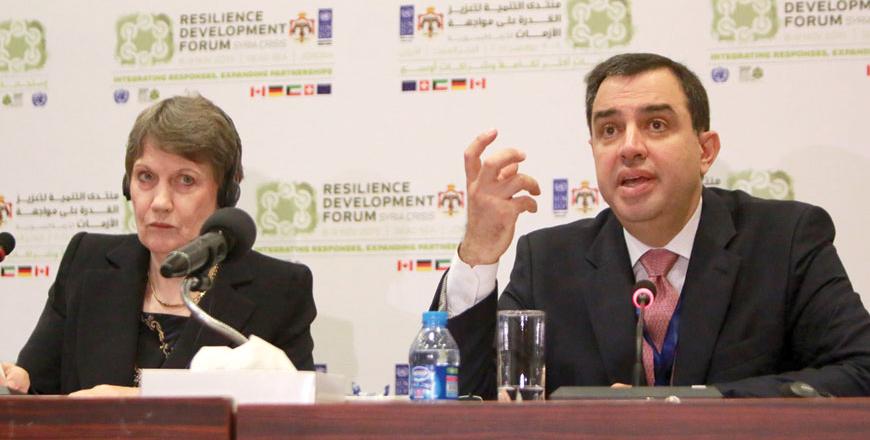You are here
Strengthening local capacities a must to ensure Jordan’s resilience in face of refugee crisis — PM
By Dana Al Emam - Nov 10,2015 - Last updated at Nov 10,2015
DEAD SEA — The preservation of local capacities is at the heart of Jordan's resilience efforts in dealing with the Syrian refugee crisis, Prime Minister Abdullah Ensour said Monday.
"We must invest in the strengthening of national systems and institutions to ensure sustainable and durable solutions," Ensour said at the opening session of the Resilience Development Forum, organised by the UNDP, highlighting stakeholders’ commitment to providing funding as a crucial issue.
Delaying investment in resilience can lead to increased social tensions in communities where basic services are overstretched or threatened as a result of the crisis, according to the premier, who added that investments in resilience continue to be realised in the long term.
Nonetheless, the "priority" is to break down the conceptual and financial modes that dominate the existing response model, as traditional aid architecture is not suited to financing the response to a protracted crisis of the scale that Jordan now faces in an effective and efficient manner, the prime minister said.
"At the same time, we need to work towards enhancing financial predictability, pooling fragmented funding, long-term funding commitments and exploring more creative avenues for the delivery of financial assistance," he noted at the event, attended by representatives from several international aid agencies.
Planning and International Cooperation Minister Imad Fakhoury said the participation of host countries, bilateral partners, major institutional stakeholders, and civil society and business sector representatives in the conference illustrated the "unprecedented" level of international commitment to ensuring a credible future for individuals whose lives are affected by this "terrible crisis", both within refugee and host communities.
Competition over scarce social resources and work opportunities has drawn impoverished refugees and equally disadvantaged citizens into a desperate "race to the bottom", an issue that risks not one lost generation, but many, the minister added.
However, Fakhoury also suggested that “we are at a moment of opportunity”, explaining that investing in the resilience of refugees and their host communities fosters stability and realistic prospects for a better future for all.
Partners should seek a cohesive and common vision for a resilience agenda that clearly articulates short-, mid- and long-term milestones, alongside clear commitments and responsibility-sharing targets for the international community, he said.
Furthermore, there is a need for concrete deliverables, particularly in the areas of aid architecture, social stability, private sector engagement and resilience inside Syria, all to be assisted by a “strong” follow-up process to ensure commitments are realised, the minister added.
“Let us build on our shared vision of a credible and prosperous future for this region,” he said.
Also speaking at the forum, UNDP Administrator Helen Clark highlighted the importance of reviewing current measures in a way that creates continuity in funding means as well as obtaining more funds for a safer future.
Clark stressed the importance of enhancing capabilities to face crises, adding that all efforts are welcomed.
She said it is important to look at the Syrian crisis seriously, especially since people want to continue living their lives.
Plans related to countries hosting Syrian refugees have to be more efficient, Clark added, commending Jordan’s role in dealing with the situation.
For his part, UN High Commissioner for Refugees Antonio Guterres stressed that the commitment of the Jordanian government and people to hosting Syrian refugees has burdened the Kingdom.
He said humanitarian aid alone is not enough to offer support, highlighting the importance of boosting the resilience of host countries in tandem with supporting refugees.
Guterres said no country has been as efficient in offering services to the Syrians as Jordan, calling for enhancing local capabilities in the Kingdom instead of creating parallel capabilities, to maintain harmony and coexistence among hosts and refugees.
He added that it is essential to review the policies of host countries, with a focus on development policies, noting that development must go hand-in-hand with military support.
Participants at the two-day forum launched the resilience agenda at its conclusion, which, according to Fakhoury, “holds the promise of converting a protracted humanitarian crisis into an opportunity to build for the future”.
The agenda, he said at the forum’s conclusion, lays out five core principles.
“First, resilience requires that we move away from the traditional siloed approach of discrete humanitarian and development frameworks designed and implemented independently of each other, both in terms of programming and financing,” he said, while the second principle entails prioritising the dignity of individuals.
“People have an innate inclination towards self-reliance and by fostering this agency as an operational imperative rather than an abstract concept, a response becomes more effective, and ultimately, sustainable,” the minister noted in his speech, a copy of which was sent to The Jordan Times.
The agenda also requires making it a priority to maintain and strengthen local institutions, rather than creating parallel systems or structures, and it calls for making the partnership platform for resilience more inclusive to fully maximise its potential.
“And finally, fifth, we must foster social cohesion so as to strengthen the social fabric of communities,” Fakhoury said.
“These commitments can bring about real change. But the real test will lie in their implementation,” he added.
The minister stressed that “resilience strengthening requires resilient financing,” warning that “donor fatigue will ultimately result in host government and host community fatigue”.
“Resilience is neither an isolated sector nor a discrete objective: it is, rather, the outcome of better integration of humanitarian and development approaches,” Fakhoury noted.
Related Articles
AMMAN — Jordan on Sunday stressed the importance of the upcoming Resilience Development Forum in producing a joint regional agenda to enhanc
DEAD SEA – Planning and International Cooperation Minister Imad Fakhoury on Monday described as "disgraceful" the volume of support to Jorda
AMMAN — Minister of Planning and International Cooperation Imad Fakhoury has participated in several high-level meetings as part of Jordan’s












